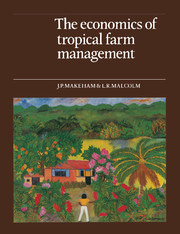Book contents
- Frontmatter
- Contents
- Preface
- Acknowledgements
- 1 Introduction
- 2 Farm management
- 3 Farm analysis and planning
- 4 Principles of production
- 5 Costs and returns
- 6 Farm profits, financial statements and records
- 7 Cash flows
- 8 Gross margins
- 9 Time is money
- 10 Planning changes
- 11 Cropping
- 12 Animals
- 13 Mechanisation
- 14 Farm development
- 15 Farm credit and finance
- 16 Beyond the farm
- Appendix 1 Interest rate tables
- Appendix 2 Metric conversion
- Glossary
- Index
16 - Beyond the farm
Published online by Cambridge University Press: 12 October 2018
- Frontmatter
- Contents
- Preface
- Acknowledgements
- 1 Introduction
- 2 Farm management
- 3 Farm analysis and planning
- 4 Principles of production
- 5 Costs and returns
- 6 Farm profits, financial statements and records
- 7 Cash flows
- 8 Gross margins
- 9 Time is money
- 10 Planning changes
- 11 Cropping
- 12 Animals
- 13 Mechanisation
- 14 Farm development
- 15 Farm credit and finance
- 16 Beyond the farm
- Appendix 1 Interest rate tables
- Appendix 2 Metric conversion
- Glossary
- Index
Summary
Farm management is primarily about things which happen on the farm. The things which happen on the farm also depend strongly on what happens beyond the boundaries of the farm. Decisions taken by governments about pricing, marketing, taxation, health, welfare services, credit, land tenure, education etc. all profoundly and directly affect what can be, and is, done on the farm. Extension officers, agricultural students, farm managers and rural financiers have to take positions on, and respond in the field to, the rules and to the changes in the rules made by governments. Awareness of the economic forces at work beyond the farm is an integral part of good farm management.
We noted in the introduction to this volume that many tropical countries lack capital, have low levels of savings and capital formation, and low incomes per head. Most of their populations work in agriculture, which contributes a large proportion of the national income. Most countries can earn export income only by exporting rural products in a relatively ‘raw’ form. As well, much agriculture is either fully or semisubsistence. Population pressure often causes massive degradation of the natural resource base. Protein intake per head, health, living and educational standards are generally low.
There is nothing so far in this volume about what the government should do. We intend this volume for local and regional extension officers advising small farmers, the managers/operators of medium-sized commercial farms, people in an agricultural teaching role, students, lending officers, cooperative managers, and local or regional planners. The volume deals with how to apply principles offarm management to get ‘a bit more’ from the limited physical and financial resources available. Its prime targets are those working in the field and the classroom, not in air-conditioned offices. We have said nothing about the way each region and country tackles its unique set of problems of how to get ‘a bit more’ for its people. There are two good reasons for this:
(i) understanding the causes of economic developmentis a specialised field of study, which is not our forte;
(ii) there is no one path to ‘pastures of plenty', and there are always several equally valid ways of attempting to solve economic problems.
- Type
- Chapter
- Information
- The Economics of Tropical Farm Management , pp. 154 - 163Publisher: Cambridge University PressPrint publication year: 1985



